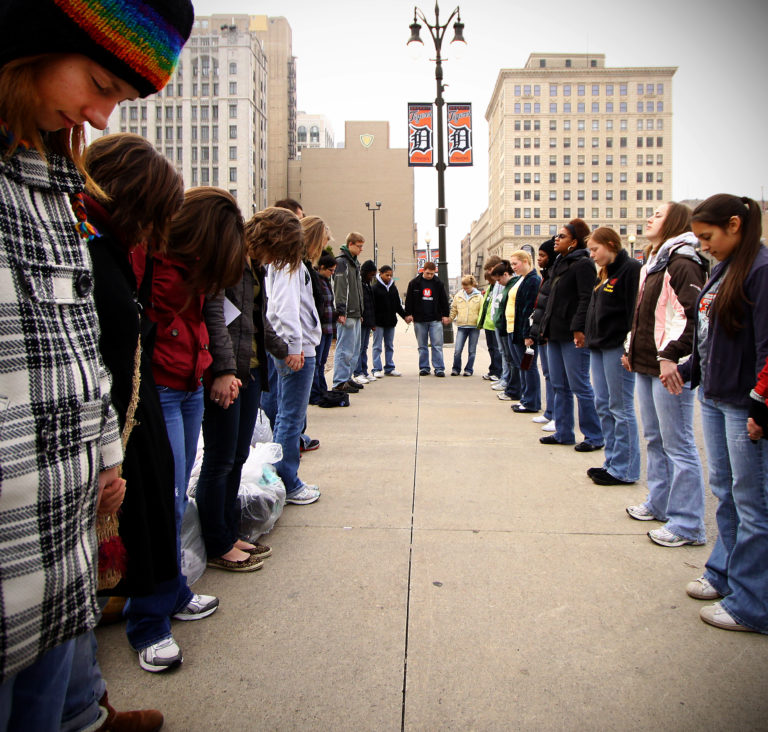
Image by Jeffrey Smith/Flickr, Attribution-NoDerivs.
The Role of Acting with Intention
Last month, I had the chance to speak at the Rubin Museum in New York with climate change activist Tim DeChristopher. The theme was karma and its relationship to how we treat the environment.
How can we think more or differently about the consequences of our actions when it comes to our planet? How can we refine our motivations to make sure our actions have integrity? Tim and I focused our talk around questions like these, seeking to explore the dynamic between the intentions of actions and their consequences. It was a challenging, rich conversation.
Tim is someone I have long wanted to meet, and is certainly someone who brings critical awareness to his actions. His role as a public figure began after he committed an act of non-violent civil disobedience in 2008. Tim inserted himself as a bidder in a governmental oil and gas lease auction in Utah, bidding .8 million for 14 parcels of land.
Since we’re on the subject of intention, Tim had no intention of paying for the land. His motivation for this disruptive act was to subvert the system, which he would achieve precisely by not paying. He knew his action disturbed the status quo, and would have a fair share of consequences.
Yet he also knew that some of those consequences would include bringing greater momentum to the climate change movement. Tim’s trust in the likelihood of this productive consequence ultimately motivated his action. Tim was taken immediately into custody by federal agents and imprisoned for 21 months until April 2013.

While he currently remains on probation for three years and attends Harvard Divinity School, Tim co-founded the non-profit Peaceful Uprising and continues to participate in the climate change movement.
During our talk together, Tim poignantly remarked:
“Karma is not a neat transaction, but a web or a ripple effect.”
It’s true. For all things we do and say, no matter how big or small, we affect many people and situations through a chain of reactions. Tim’s actions that day in 2008, for instance, didn’t just lead to his imprisonment, but it did have significant ramifications for the climate movement.
In the first two weeks of November 2015, the “Keep It in the Ground” act was approved. construction of the Keystone pipeline was vetoed; Exxon is being investigated by the New York state attorney general’s office. The list goes on. Tim’s personal action served a role in the chain of causes of these various “wins” for the climate movement.
In Buddhism, actions are thought of as having different aspects, and the notion of intention or motivation is a particularly important aspect, especially when it comes to karma. To simplify the concept of intention, let’s take the example of Tim’s action — bidding .8 million for 14 parcels of land. Another person could have bid the same amount of money for the same amount of land with the earnest intention of paying the money, and without thinking critically about the effects the oil and gas industries have on our environment. Or this other person could’ve done the same thing with the intention to gain recognition or political validation. One action, three radically different intentions. The number of intentions motivating any given action is, in fact, varied and complex.
The question of intention is definitely tricky. I’m sure we’ve all known a person who professes to have “good intentions,” but who has hurt us. In a similar vein, it’s possible for someone to act generously but be motivated by self-absorption. This person may give gifts or attention or anything else to others not because she wishes to cultivate generosity, but to get attention or validation.
The importance of intention should not be a reason to believe that actions themselves don’t count. Just as the ripening of a seed into fruit depends on other variables like soil quality or quantity of water, intentions can’t be considered the only thing that brings about a particular set of consequences.

Of course, this trickiness is also due to the fact that only we can really know our own intentions. With every thing we say and do, others can only witness the speech act or action in question. It is up to each of us to bring skillfulness to our lives, which we do by cultivating an awareness of where we are putting our energy.
My friend Joseph Goldstein, also a meditation teacher and author, tells a personal story to illustrate the poignancy of intention. Joseph, like me, relies on his own life experiences, as well as the experiences of his students, to give greater texture and nuance to the books he writes and the talks he gives. In all walks of life, Joseph is constantly collecting anecdotes to make his teachings more concrete and meaningful. He often tells this story:
Several years ago, we were writing books at the same time. During this time, Joseph had an experience that struck him as a particularly ripe anecdote, and he became very attached to it, and intended to use it in his book. But one day, he decided that it would be a better fit for my book. His awareness of his desire to keep the story for himself confronted his awareness of my project and our friendship, and provided an interesting play within his own mind as he went back and forth. Finally, he decided to offer me the story. In the end, I decided it wasn’t really a fit for my book, which gave him a double win. He got the chance to be generous, and he got to use the story.
We’re often told to follow our hearts, as though raw emotion is the truest stuff there is to go by in life. Life shouldn’t just be about “following” the heart. The idea of training our hearts is much more skillful, as it takes into account the importance of finding a purity of motivation.
If we are aware of what we are thinking and feeling, and thinking critically about what we want to do and say based on those thoughts or feelings, we are acting with intention. We are not simply walking along the path of least resistance, but creating a productive route for ourselves, and sometimes that’s challenging. It’s in that challenge we come alive. That is the place where what we care about most and what might seem like the easy way out — or what everybody else seems to want, or the most we can get — meet.

Share your reflection